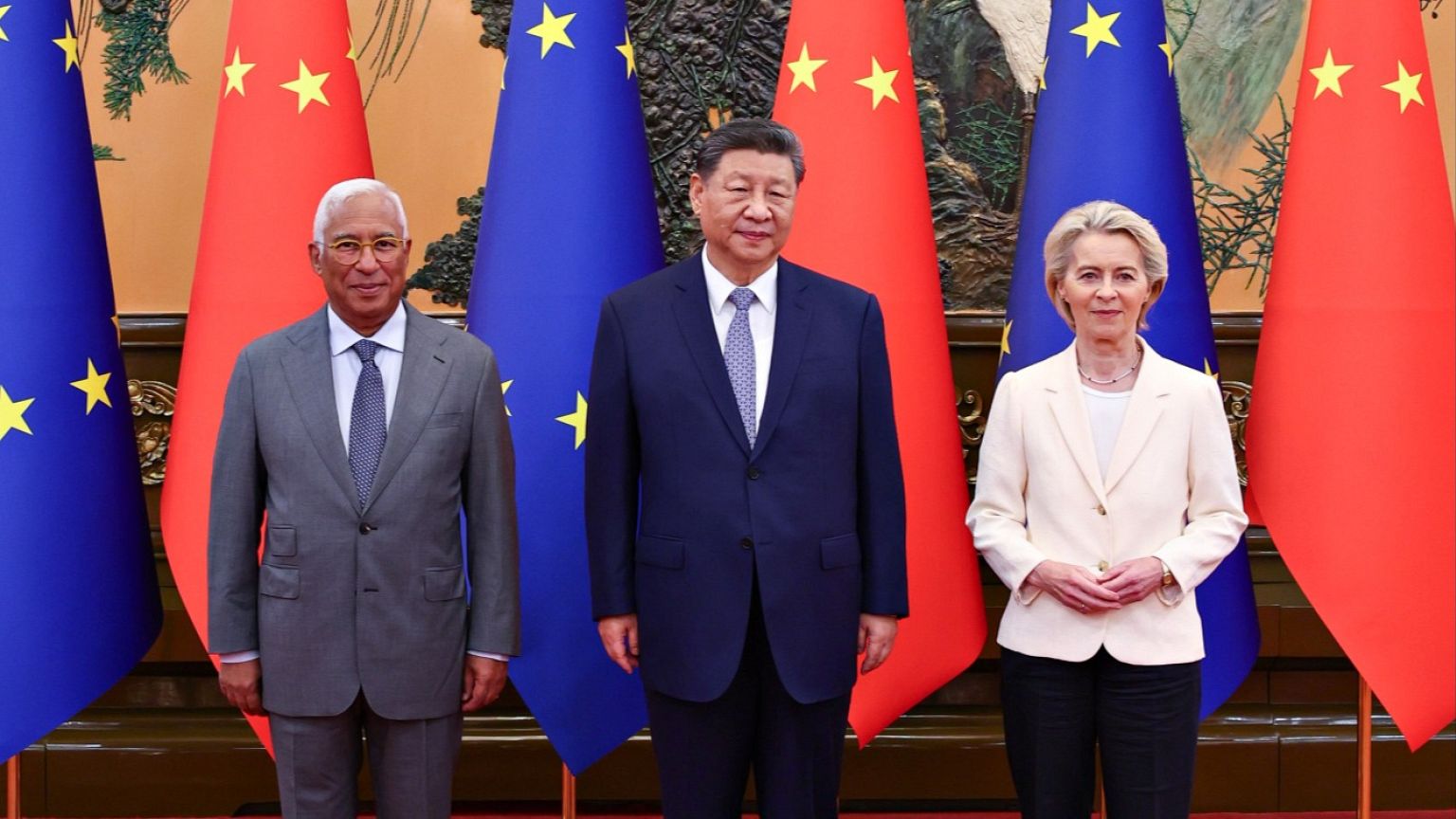Business
EU Demands Trade Rebalance with China After Rare Earth Talks

The European Union concluded a one-day summit in Beijing with a call for immediate action to rebalance trade relations with China. On Thursday, the EU announced a tentative agreement aimed at easing restrictions that China imposed on critical exports of rare earths, a situation that has raised significant concerns within the bloc and has the potential to paralyze several key industries.
The stringent export controls, initiated in early April during an escalating trade dispute with the United States, severely impacted the global supply of seven rare earth elements and magnets essential for the defence, energy, and automotive sectors. Ursula von der Leyen, President of the European Commission, articulated the urgency of the matter, stating, “These export controls have placed significant strain on some European companies.” She emphasized the necessity for “reliable and secure supplies of critical raw materials from China” to maintain trust in the trade relationship.
Agreement to Enhance Export Licences
During the summit, von der Leyen welcomed China’s commitment to expedite export licences for rare earths and the introduction of a new system designed to address barriers and delays in the supply chain. “We agreed, and this is new, to have an upgraded export supply mechanism,” she mentioned. This mechanism aims to swiftly identify and resolve any bottlenecks in the supply chain.
Despite these advancements, von der Leyen underscored that substantial progress is still required to effectively rebalance EU-China trade relations, which registered a goods deficit exceeding €300 billion last year. This deficit is anticipated to widen in 2025 due to sluggish demand from Chinese consumers and tariffs imposed by former US President Donald Trump. “We have reached a clear inflection point,” she added, asserting that a mutually beneficial trade relationship must be founded on fairness.
In addition to the rare earths restrictions, von der Leyen highlighted the need for improved access to the Chinese market for European companies, matching the access Chinese firms enjoy in Europe. She also addressed the issue of industrial overcapacity, which has been exacerbated by China’s extensive subsidies that lower manufacturing costs, affecting international competitors. The situation escalated in October when the EU imposed tariffs on Chinese electric vehicles to counteract state aid practices. Beijing’s response included investigations into EU-made products, which the EU condemned as unjustified.
Ongoing Tensions and Future Engagements
The summit concluded without significant breakthroughs on these contentious issues. Von der Leyen warned that without concessions from China regarding its overcapacity, “it would be difficult for the EU to maintain its current level of openness.” Alongside her, António Costa, President of the European Council, expressed serious concerns regarding the imbalance in EU-China commerce. He articulated the bloc’s willingness to engage in “open and constructive dialogue” to achieve equitable trade relations.
Chinese officials presented a more optimistic perspective following the summit, citing “new opportunities and potentials” for EU-China relations. However, they also cautioned the EU against implementing trade measures that could hinder cooperation, as seen in the electric vehicle dispute. Chinese President Xi Jinping urged the EU to foster a conducive business environment for Chinese enterprises operating within Europe and criticized the bloc’s efforts to reduce dependencies on China, a strategy termed “de-risking” by EU leaders.
Another significant point of contention was the ongoing conflict in Ukraine. The EU has accused China of enabling Russia by supplying critical components for weaponry, a claim Beijing has denied. Costa reiterated that as a permanent member of the UN Security Council, China bears responsibility in this global conflict, which extends beyond Europe. “The war in Ukraine goes far beyond Europe – it is a conflict with global implications,” he stated.
As the summit wrapped up, both sides issued a joint declaration committing to climate action ahead of the COP30 conference, illustrating a shared interest in addressing global environmental challenges despite ongoing trade disputes. The discussions made clear that while there are pathways for cooperation, significant hurdles remain in reshaping EU-China trade dynamics to achieve a more balanced relationship.
-

 Top Stories2 months ago
Top Stories2 months agoTributes Surge for 9-Year-Old Leon Briody After Cancer Battle
-

 Entertainment3 months ago
Entertainment3 months agoAimee Osbourne Joins Family for Emotional Tribute to Ozzy
-

 Politics3 months ago
Politics3 months agoDanny Healy-Rae Considers Complaint After Altercation with Garda
-

 Top Stories3 months ago
Top Stories3 months agoIreland Enjoys Summer Heat as Hurricane Erin Approaches Atlantic
-

 World4 months ago
World4 months agoHawaii Commemorates 80 Years Since Hiroshima Bombing with Ceremony
-

 Top Stories2 months ago
Top Stories2 months agoNewcastle West Woman Patricia Foley Found Safe After Urgent Search
-

 Top Stories4 months ago
Top Stories4 months agoFianna Fáil TDs Urgently Consider Maire Geoghegan-Quinn for Presidency
-

 World4 months ago
World4 months agoGaza Aid Distribution Tragedy: 20 Killed Amid Ongoing Violence
-

 World4 months ago
World4 months agoCouple Convicted of Murdering Two-Year-Old Grandson in Wales
-

 World4 months ago
World4 months agoAristocrat Constance Marten and Partner Convicted of Infant Murder
-

 Top Stories3 months ago
Top Stories3 months agoClimbing Errigal: A Must-Do Summer Adventure in Donegal
-

 Top Stories3 months ago
Top Stories3 months agoHike Donegal’s Errigal Mountain NOW for Unforgettable Summer Views









